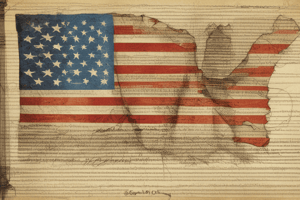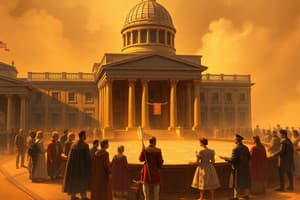Podcast
Questions and Answers
Who were the delegates at the Constitutional Convention of 1787?
Who were the delegates at the Constitutional Convention of 1787?
- A mix of men and women from various backgrounds
- Delegates from every state in America
- All white men not chosen by popular election (correct)
- A diverse group elected by the people
What was the main purpose of the Constitutional Convention?
What was the main purpose of the Constitutional Convention?
- To write an entirely new constitution (correct)
- To discuss issues within the state legislatures
- To fix the Articles of Confederation
- To hold a popular vote on the Articles of Confederation
Which state did not send any delegates to the Constitutional Convention?
Which state did not send any delegates to the Constitutional Convention?
- Rhode Island (correct)
- New York
- Massachusetts
- Virginia
How were the newly proposed constitutional changes to be ratified?
How were the newly proposed constitutional changes to be ratified?
What aspect of government do some critics want the Constitution to address?
What aspect of government do some critics want the Constitution to address?
What common agreement existed regarding essential rights before the Declaration of Independence?
What common agreement existed regarding essential rights before the Declaration of Independence?
How did the delegates choose to conduct the Convention?
How did the delegates choose to conduct the Convention?
What suggestion is made regarding modern conventions and communication?
What suggestion is made regarding modern conventions and communication?
What phrase did Jefferson change in his formulation of rights in the Declaration?
What phrase did Jefferson change in his formulation of rights in the Declaration?
What was the primary concern of most Americans during the American Revolution?
What was the primary concern of most Americans during the American Revolution?
Which of the following does NOT reflect a complaint listed by Jefferson against George III?
Which of the following does NOT reflect a complaint listed by Jefferson against George III?
What did the Declaration of Independence emphasize as unalienable rights?
What did the Declaration of Independence emphasize as unalienable rights?
How did the majority of citizens view their property during the late-18th century?
How did the majority of citizens view their property during the late-18th century?
What economic condition was prevalent during the American Revolution?
What economic condition was prevalent during the American Revolution?
What role did war profiteers play during the conflict?
What role did war profiteers play during the conflict?
What was the general socio-economic status of most Americans at the time of the Revolution?
What was the general socio-economic status of most Americans at the time of the Revolution?
Flashcards are hidden until you start studying
Study Notes
Constitutional Convention (1787)
- Held in Philadelphia with all delegates being white men; not elected by popular vote.
- Notable absentees included Patrick Henry and the state of Rhode Island which sent no delegates.
- The convention was conducted in secrecy with no press coverage.
- Aimed to address deficiencies in the Articles of Confederation, ultimately resulting in the creation of a new Constitution.
- Popular conventions in at least nine states needed to ratify the new Constitution, rather than state legislatures.
Perspectives on Constitutional Change
- Critics suggest a new constitutional convention to amend perceived defects in the Constitution.
- Diverse opinions exist regarding potential reforms, such as adopting a parliamentary system similar to the UK.
- Some advocate for a weakened federal government, proposing measures like balanced budgets or revenue caps.
- Key questions include the delegate selection process, their number, limitations on convention scope, and media coverage of the proceedings.
Rights and Ideology of the American Revolution
- Essential rights enshrined prior to Jefferson's Declaration of Independence included life, liberty, and property.
- Jefferson notably shifted "property" to "the pursuit of happiness" in the Declaration.
- The American Revolution was not solely a class struggle; many citizens owned property and were self-employed.
- Economic struggles were prominent post-war, with higher taxes and disrupted trade; thus, the conflict was viewed politically rather than economically.
Jefferson's Declaration of Independence
- Jefferson asserted self-evident truths about equality and unalienable rights as foundational for government.
- Governments derive their powers from the consent of the governed; people can alter destructive governments.
- Subsequent paragraphs of the Declaration list specific grievances against King George III, all focused on violations of political liberties, not social or economic conditions.
- The Declaration is seen as both a philosophical assertion and a detailed legal complaint against British policies.
Studying That Suits You
Use AI to generate personalized quizzes and flashcards to suit your learning preferences.




